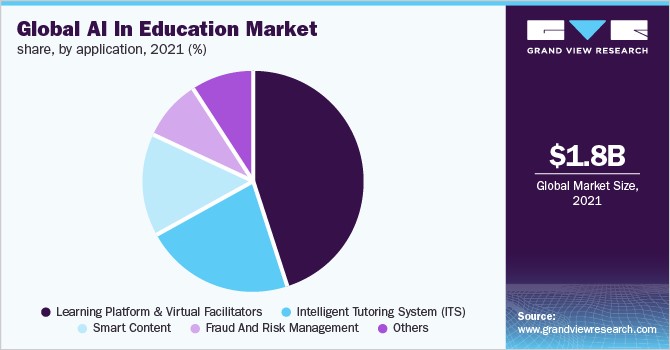
Everything You Need To Know About AI In Education: Comprehensive Guide
In this technologically advanced era, AI has revolutionized every industry including the education industry. According to grandviewresearch.com, the global AI in education market is $1.8Billion and it will grow from here as time goes by.

There are plenty of AI writing tools that have become very popular among students with which they can complete their assignments, essays, or any of their school projects in the blink of an eye. This may negatively impact the student’s academic progress and also raise a question of academic integrity and cheating.
If you also have the same worries, then don’t worry we have got you covered.
In this blog post, we will discuss the role of AI in education, AI plagiarism, and how you can promote.
Before you move to the topic, can we ask you a quick question? Do you follow us on Social Media? If not, then you’re missing out on a lot of informative content. We regularly share upgraded educational content, tips, feedback, and more. Check us out by clicking the profiles here - Facebook / Twitter / LinkedIn / Pinterest / Instagram / YouTube
So, without any further delay, let’s get started.
Understanding AI's Role In Education
Artificial intelligence (AI) has made a huge impact on every person's life in every industry, especially in the education industry. Students are the ones who are getting more benefits than any other member of the education industry.
AI is a next-level technological tool that operates on sophisticated algorithms and machine-learning techniques that deal with vast amounts of data from all over the world’s available data like-
- Books
- Articles
- Research paper
- And other written content
This enables AI technology to understand the patterns, structures, and the way of language that is being used in learning. It also helps students to figure out different topics, prompts or even well-written notes on any of the mentioned topics.
All an individual need to do is just to write a simple prompt and it will generate the solution like a genie instantly. Not only this, AI tools can also help students with grammar, vocabulary, and spelling checks which helps students to write anything without the concern of being wrong.
How Students Can Get Negatively Impacted By AI?
There’s no denying that AI brings lots of benefits to the user, especially students. However, it also brings the ethical concern of academic dishonesty. Let’s get to know several points which could negatively impact student’s academic journey:
Culture of Academic Dishonesty
AI-powered writing tools make it easy for students to cheat on their assigned tasks or homework. The ease of use and convenience of these tools may lead students to misuse them by producing full writing content which counts as AI plagiarism without proper acknowledgment.
Difficult To Detect Content
The combination of AI-generated text with human-written content presents a substantial problem for educators and plagiarism detection systems. The complex algorithms utilized by AI programs can generate content that closely resembles human writing, making it difficult to detect instances of cheating in assigned tasks o, homework, or essays to students.
High Chances of Generating Plagiarized Content
AI-powered writing tools can produce content that closely resembles existing sources, resulting in AI plagiarism or bot-enabled plagiarism content if not properly acknowledged. Students may mistakenly submit written tasks with sections that closely resemble previous works without properly referencing the original sources.
Lack of Personal Touch
AI plagiarized content lacks the personal voice, experiences, and authenticity that can clearly give an indication that the content is AI-generated These written content materials may lack the personal touch and genuine reflection that is expected of students' work.
Various Academic Consequences
Indulging in using AI plagiarism content can have serious consequences for students. Academic dishonesty is considered to be a serious offense by educational institutions, with punishments including failing grades, academic suspension, or even being expelled.
Defeat The Purpose of Educational System
Generating plagiarized content with artificial intelligence opposes essential educational ideas such as critical thinking, creativity, and the development of writing skills. It undermines the efforts of hardworking students who devote time and effort to completing their tasks on their own.
Creates Misrepresentation of Student’s Abilities
Writing content with AI plagiarism misrepresents students' talents and abilities. Admissions officers, employers, and instructors use the writing content to evaluate a student's writing abilities, critical thinking skills, and capacity to articulate oneself. Cheating weakens the trust and confidence people have in these assessments.
Limit The Learning Opportunities
The act of cheating limits students' invaluable learning opportunities. Doing tests, homework or any writing task helps students improve their research, critical thinking, and communication skills. Students who rely on AI plagiarism content miss out on the opportunities for growth and development that come with participating in the writing process.
Face Long-Term Negative Consequences
Relying on bot-enabled plagiarism content might have consequences over time in addition to immediate academic consequences. It can harm students' reputations, undermine their integrity, and hamper their personal and professional development. Cheating-related habits and mindsets might carry over into future undertakings, influencing ethical decision-making.
How To Promote Responsible Use of AI in Education?
AI plagiarism might have a negative impact on student’s upcoming future. However, if as a responsible educator, you teach them how they can use AI just to enhance their skills and abilities rather than completely relying on it can be a game changer. Let’s get to know how you can teach students to use AI responsibly to maintain ethical practices and guidelines.
Transparent Disclosure
AI tool providers' platforms should be open about the capabilities and limits of their AI-powered authoring applications. Students should be given concise and simple information about the use of AI in the writing process, emphasizing that AI should be used to enhance their writing rather than replace their own efforts.
Educate Students about AI
Integrating AI education into curricula can help students comprehend the capabilities, potential biases, and ethical concerns associated with AI. Students who get a better understanding of AI can make more educated judgments about how to use technology responsibly and ethically in their academic work.
Developing Ethical Principles
Collaboration among educators, institutions, and AI developers is critical in developing ethical guidelines for the use of AI in education. These standards should cover topics such as plagiarism, correct citation, and the acceptable incorporation of AI-generated information into student work.
Promoting Critical Thinking
AI-powered writing tools should prioritize critical thinking skills over content generation. Students should be taught to critically engage with AI-generated proposals, assessing their relevance, correctness, and appropriateness against their own thoughts and arguments.
Promote Authenticity
Students should be reminded of the importance of originality and authenticity in their work. They should be encouraged to communicate their own viewpoints, generate their own ideas, and cultivate originality in their writing. AI technologies can help with this process by giving assistance and suggestions that complement rather than replace students' original thinking.
Proper Citation Practices
AI tools can help students improve their citation skills. Educators should emphasize the need for proper citation and teach students how to use AI-generated content in their writings while crediting the original sources. This preserves academic honesty and prevents unintended AI plagiarism.
Continuous Assessment and Improvement
Educational institutions should regularly assess the impact and efficacy of AI-powered writing tools in promoting responsible use. Feedback from students and educators can help identify areas for development and refine the tool's functionality to meet ethical standards.
Fostering Student Empowerment
Students should be enabled to take ownership of their academic work and use AI tools to enhance their learning journey. They should be encouraged to use AI-powered writing tools to improve themselves, learn, and grow their talents rather than depending on them as quick fixes.
Ethical Decision-Making Interactions
Engaging students in conversations and case studies about ethical decision-making will help them better comprehend the potential ramifications of unethical AI use. Such discussions should center on AI's impact on academic integrity, intellectual property, and the appropriate use of technology in education.
AI Technology Is Here To Stay
AI technology is the future. You can’t keep AI out of the equation, especially in the education industry, where it gives students an opportunity to get every answer and homework in the blink of an eye.
However, with the above-mentioned tips for teaching responsible use of AI in education, educators can make sure that students use AI fairly to enhance their learning skills rather than relying on it completely to lose the learning opportunity completely.
Additionally, if you want to learn more latest methods, skills, and everything about the education industry. Then consider pursuing an Integrated Master’s and Professional Doctorate in Education, where you will get to learn from top expert trainers.
We believe education should be accessible for everyone. That’s why we don’t charge for our blogs. Find the right course that will help you in your career with us, contact us at +66-21055721. You can mail us at act@asiancollegeofteachers.com

